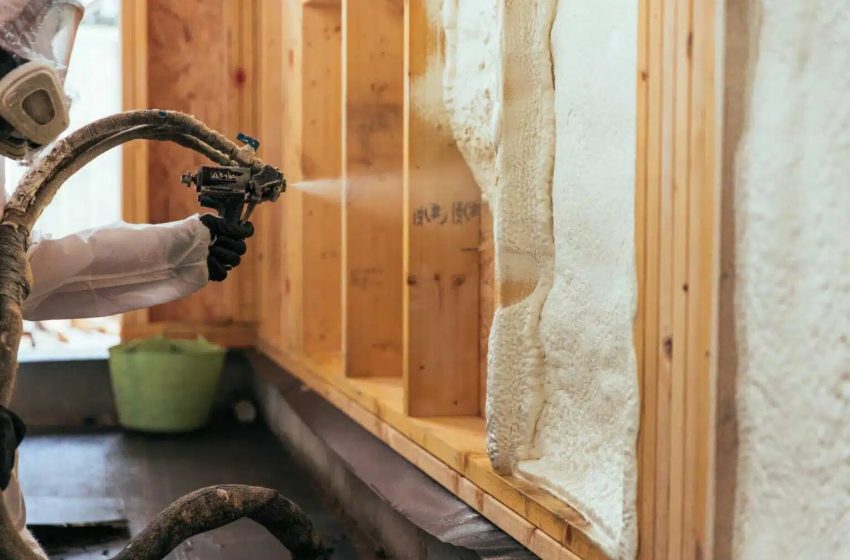The Fire Resistance of Closed-Cell Spray Foam

When considering insulation for homes or businesses, safety is always a top priority. One important factor that influences the choice of insulation is fire resistance. Among the various insulation options available, closed-cell spray foam is often highlighted for its thermal performance and fire-resistant properties. This blog post will dive into the fire resistance of closed-cell spray foam, its benefits, and how it can contribute to a safer, more energy-efficient property in Medford, OR, and beyond.
What Is Closed-Cell Spray Foam?
Closed-cell spray foam is a type of insulation made from a mixture of chemicals that expand upon application, creating an airtight seal. Its dense structure provides excellent thermal insulation while also acting as a moisture barrier. It is commonly used in both residential and commercial buildings because of its energy efficiency, durability, and versatility. But when it comes to fire safety, closed-cell spray foam offers unique advantages.
How Fire Resistant Is Closed-Cell Spray Foam?
One of the key concerns when choosing an insulation material is how it behaves in the event of a fire. Closed-cell spray foam has certain fire-resistant properties that make it a popular choice in areas where fire safety is paramount.
While closed-cell spray foam is not completely fireproof, it is designed to be fire-retardant, meaning that it will resist ignition to a certain degree and slow down the spread of flames. Manufacturers typically incorporate fire retardants into the foam to enhance its ability to withstand heat and reduce the risk of combustion.
Performance Under Fire Conditions
In a fire scenario, closed-cell spray foam will char on the surface when exposed to direct flame. This charring creates a barrier that slows down the spread of the fire, reducing the amount of heat transferred to the underlying materials. This behavior helps protect the structural integrity of the building and can provide occupants with additional time to evacuate the premises.
However, it is essential to note that while closed-cell spray foam can help delay the progression of fire, it should not be considered a stand-alone fire protection system. Building codes often require the application of additional fire-resistant barriers, such as drywall, to further enhance safety.
Why Is Fire Resistance Important?
Fire resistance is critical for both safety and compliance with local building regulations. Medford, OR, and its surrounding areas have specific building codes that dictate the use of fire-resistant materials in construction, especially in regions prone to wildfires or other fire risks. When choosing insulation, it is essential to ensure it meets these standards.
For homeowners and business owners, investing in fire-resistant materials like closed-cell spray foam not only offers peace of mind but can also minimize property damage in case of a fire. Additionally, insurance companies may offer more favorable rates for properties equipped with fire-resistant features.
Fire Safety Standards for Closed-Cell Spray Foam
The fire resistance of closed-cell spray foam insulation is evaluated based on several industry standards. One such test is the ASTM E84, also known as the “surface burning characteristics” test. This test measures the flame spread and smoke development of building materials, ensuring that insulation products meet specific fire safety requirements.
Closed-cell spray foam typically falls into Class 1 or Class A, which indicates that it has a flame spread index of 25 or less and a smoke development index of 450 or less. These classifications are crucial for ensuring that the material adheres to local building codes and contributes to a safer living environment.
Does Spray Foam Meet Building Codes in Medford, OR?
Yes, closed-cell spray foam insulation generally meets the building codes for fire safety in Medford, OR, and the surrounding regions, provided it is installed correctly and paired with the necessary fire-protective barriers. Contractors working in areas like Ashland, Central Point, and Eagle Point are familiar with the regulations and can help ensure that your insulation complies with both fire safety and energy efficiency requirements.
Enhancing Fire Safety with Closed-Cell Spray Foam
When installed properly, closed-cell spray foam can improve overall fire safety by acting as a first line of defense against fire hazards. Some additional benefits include:
1. Slows Fire Spread
-
Due to its fire-retardant properties, closed-cell spray foam slows the progression of flames, giving occupants more time to escape.
2. Reduces Smoke Generation
-
During a fire, smoke inhalation poses a significant risk. Closed-cell spray foam produces less smoke compared to other insulation types, helping to minimize this hazard.
3. Improves Structural Integrity
-
As the foam chars and insulates underlying materials from heat, it helps preserve the structural integrity of walls and ceilings during a fire.
Installation Considerations for Fire Safety
To maximize the fire-resistant qualities of closed-cell spray foam, proper installation is critical. Professional installation ensures that the foam adheres to all building safety standards, including those related to fire protection.
In regions like Medford, where wildfires can be a concern, hiring experienced professionals to install your spray foam insulation is essential. They will ensure that fire barriers are correctly applied and that the insulation meets all local fire safety codes.
FAQs About Fire Resistance of Closed-Cell Spray Foam
Q1: Is closed-cell spray foam completely fireproof?
-
No, closed-cell spray foam is not fireproof. However, it is fire-retardant, meaning it can resist flames and slow the spread of fire.
Q2: Can closed-cell spray foam help with wildfire protection?
-
Yes, closed-cell spray foam can contribute to wildfire protection by slowing the spread of fire and reducing the risk of ignition. However, it should be used alongside other fire safety measures like fire barriers and fire-resistant roofing.
Q3: Does closed-cell spray foam require additional fire barriers?
-
Yes, in most cases, local building codes will require the installation of a fire-resistant barrier, such as drywall, over closed-cell spray foam insulation for enhanced safety.
Q4: How long does closed-cell spray foam last?
-
When installed properly, closed-cell spray foam can last for decades. Its durability, combined with its fire resistance, makes it a long-lasting solution for insulation needs.
Q5: Does closed-cell spray foam meet Medford, OR building codes for fire resistance?
-
Yes, closed-cell spray foam generally meets the fire resistance requirements outlined in Medford, OR, building codes. Always ensure it is installed by a licensed professional who is familiar with local regulations.
Conclusion
Closed-cell spray foam insulation offers excellent fire-resistant properties, making it a reliable choice for homeowners and businesses looking to enhance their property’s safety. Its ability to slow fire spread, reduce smoke production, and improve structural integrity in a fire makes it a popular choice in Medford, OR, and nearby areas like Ashland, Central Point, Eagle Point, Grants Pass, and Roseburg.
For professional installation of closed-cell spray foam that meets fire safety standards, contact All Foam & Insulation, LLC at (541) 402-2500 today. Stay safe and insulated with high-quality spray foam insulation!

